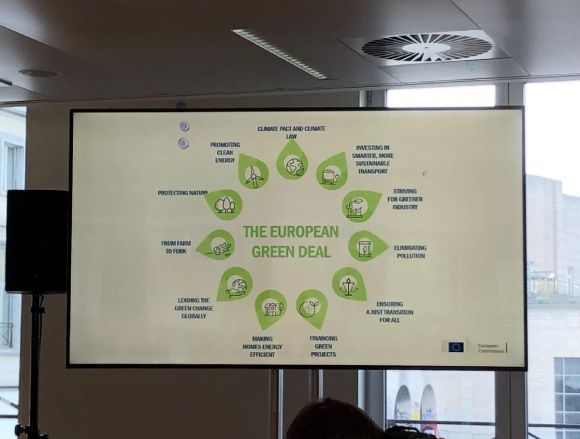
As the European Green Deal currently represents the main priority of the EU policy, it is no wonder that the topic is being largely discussed among the member countries. To be the first continent that will achieve climate neutrality and become the role model for others - that is the ambitious goal, Ursula von der Leyen has stated for the union.
By Eliška Volencová (Edited by Dino Subašić)
The President of the European Commission strongly supports this transition and emphasizes, that it is not only about the protection of the environment, but also about creating new jobs and triggering the growth of the sustainable economy. However, this transition has to happen not only on the global and EU level. The focus must be given on the national and regional level especially because it’s always the little pieces that create the whole.
Since the member states of the European Union are very diverse, it’s necessary to cooperate and support each other in the collective effort. As von der Leyen has said, we must recognize and respect that we do not all start from the same point. Therefore, the cohesion policy has a crucial role in this process.
Different starting points as an opportunity for European help
It is a fact that the differences not only between states but also between particular regions and cities are significant. For instance, while Poland is being almost fully dependent on coal, most of Sweden’s electricity supply comes from hydro, nuclear, and wind power plants. Renewable energy is what we aim for. However, for some regions, the transition cannot happen overnight and that needs to be taken into account.
Another example out of many aspects can be the way countries handle waste management and the potential for the circular economy. We can see that the most developed countries of the union have managed to reduce the landfilling of the waste to a minimum, whereas recycling and incineration take care of most of the produced trash. That is in big contrast with the situation in countries like Greece, Malta, or Romania, which still depend mainly on the landfilling strategy.
Luckily, the European funds are here to ease the situation. Especially the Social Climate Fund was created with the aim to support and ensure the fair and just transition for all the regions of the EU. The money is being allocated based on the level of development of the particular areas, their infrastructure, and the dominant resources. The plan of the cohesion policy for the years 2021-2027 counts with a total budget of around EUR 350 billion which can be used for various different projects. The initiators can apply for financial support from a couple of specialized funds such as The European Regional Development Fund or The Cohesion Fund.
We can already see many examples of innovative projects, which contribute to the collective ambition and values. Co-Responsibility in District Energy Efficiency and Sustainability is a new energy ecosystem at Clichy Batignolles taking up an area of 54 hectares. The aim is to reduce 90 % of the CO2 emissions in the area by energy efficiency.
New Textile in Finland turns old cotton into innovative new fiber and so helps the textile industry to become more sustainable.
Just as important as implementing sustainability into our living and industry is to enhance the protection and preservation of nature and biodiversity. For example, the protection of bees stands for a good example. This initiative operates in 6 countries, which collaborate all together.
The struggles and the solutions of the Green Transition
Despite the numerous successful green projects all around the continent, the policy still struggles with the indifference of many citizens when it comes to the green transition. Moreover, some people consider it quite dangerous, and they stand against it. Some voices say that the concern about the environment is an ideology used against successful companies and plants. They do not realize the urgency of this climate-related problem, which we all face today. And that is for sure something the EU should address more. It is extremely important to gain the support of people from all social backgrounds and geographical areas because only with the support of civil society we can lead this fight successfully.
A result of this effort should be a more social and inclusive Europe, which stands closer to its citizen. Europe, which is greener, more competitive, and smarter. At least that should be what the future promises us.



